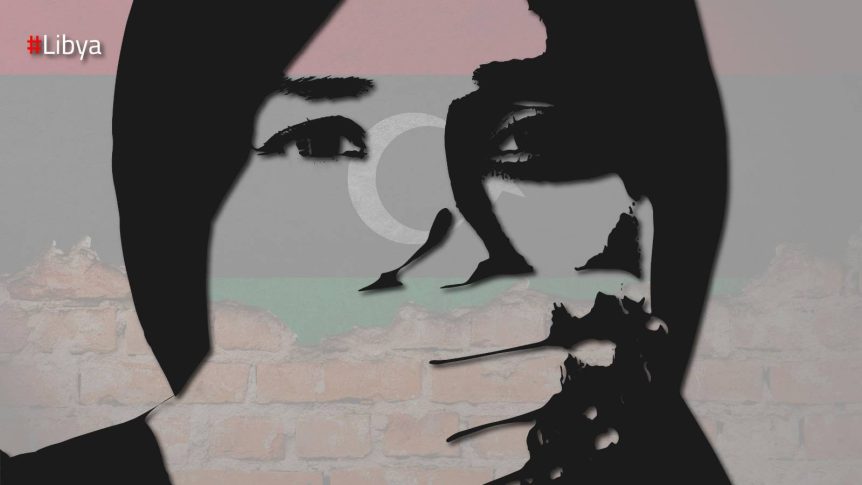On 6 November 2024, plans to establish a ‘Morality Police’ and impose veiling on women were announced by Libya’s Minister of the Interior, Imad Trabelsi, representing the Tripoli-based internationally recognized Government of National Unity (GNU). This development is part of a broader pattern of government actions that threaten to deepen repression under the pretext of safeguarding ‘public morals’—a pretext long used to crack down on activism and civil society in Libya. The GNU should immediately scrap such measures and respect people’s right to autonomy, dignity and freedoms.
During a press conference, the Minister said that the morality police will endeavor to control all aspects of social life and to correct deviant conduct, ranging from clothing, hair styles, use of social media, gender mixing in cafés, and women veiling.
Following that announcement, the GNU introduced a series of measures that serve to consolidate its grip on public and private life and to erase personal freedoms. It adopted Decision No. 422 of 2024, creating the ‘General Department for the Protection of Public Morals’ within the Ministry of the Interior. This department has been granted sweeping powers to monitor public spaces, such as cafes, theaters, hotels, and restaurants, while enforcing laws targeting so-called ‘moral crimes’.
‘The GNU appears determined to effectively drag Libya back to the stone age by stifling any hope for a modern, inclusive society. While the GNU systematically refuses to enact laws that protect civil society, trade unions and promote free speech, it has diverted state resources to enact Taliban style measures aiming at undermining the basic freedoms of women’, said Ziad Abdel Tawab, Deputy Director of CIHRS.
In July 2024, the Presidential Council, which functions as Libya’s head of state, established the Public Morality Protection Authority under Decision No. 14, appointing Major General Mohamed Abu Hajar, head of the Tripoli Police Academy, to lead the body. This authority is empowered to monitor cultural and social behaviors, regulate civil society organizations and youth programs, and investigate social media for ‘deviant’ content deemed harmful to societal values. It has also been empowered to shape public discourse through research, studies, and collaboration with academic institutions, extending the state’s reach into virtually all aspects of public life. The increased reliance on religious rhetoric was also visible in the issuance, in May 2023, of a decree by an official religious body, the General Authority for Endowments and Islamic Affairs (known as Awqaf), to combat what it called ‘religious, intellectual and moral deviations’.
On 11 November, the Ministry of Youth issued Circular No. 7 of 2024, imposing strict new requirements on youth organizations. Under the directive, any trips abroad or activities outside Libya require prior government approval, including on the details of program content, objectives, and the foreign entities involved. This policy is officially framed as a measure to ‘preserve national identity and societal norms, and to protect the youth from activities contrary to religious and social norms’, but it could likely be used as another mechanism to restrict civil liberties and stifle independent initiatives.
Taken together, these actions reflect a systematic effort by the GNU to curtail freedoms and tighten control over Libyan society, youth and Libyan women. The use of ‘morality’ as a justification for these measures highlights a troubling trend toward repression disguised as cultural preservation.
The timing of these measures coincides with a worsening financial crisis in Libya. A leaked Central Bank letter recently revealed shortfalls in oil revenues and the GNU’s inability to cover public sector salaries for October and November. It is troubling to see the government’s intensifying focus on morality enforcement, which could serve as a distraction from economic mismanagement, leveraging populist rhetoric to shift public attention away from financial deficits and declining foreign currency reserves.
In a recent report, CIHRS documented the use of religious and morality arguments to crack down on dissent in Libya. The report shows how the security apparatus alongside armed factions, influenced by Salafi Madkhali ideology, have established a significant presence in both Eastern and Western Libya, with affiliations in major armed groups providing them with considerable military power and, subsequently, political sway over the rival governments that emerged after 2014. These armed groups operate under the direction of the Internal Security Agency (ISA) in both Eastern and Western Libya. They have specifically targeted freedoms of expression and association, as well as women’s rights, by exploiting legislation from the Gaddafi era and cloaking their actions in claims of moral and religious compliance.
The announcement of plans to reinstate the Morality Police is particularly alarming given its historical context. Established in 1992 during the Gaddafi regime, the unit was modeled on Iran’s Islamic enforcement practices and remained active until the late 1990s. Although the Morality Police ceased operations after the 2011 revolution, the concept resurfaced in March 2024 with the Ministry of Religious Affairs’ ‘Guardians of Virtue’ program, which received support from the Ministry of the Interior and other government entities.
The announcement of these measures has already led to threats and harassment against media professionals and human rights defenders who have criticized the Minister’s statements online. Libyan journalist Zainab Tirbah said on social media that she is facing a widespread campaign of attacks on social media after appearing in a live broadcast criticizing statements made by the Libyan Minister of the Interior. Additionally, the civil activist and former candidate for the Tripoli Municipal Council elections, Ahlam Nasser Ben Taboun, said that she received explicit threats through Facebook messages, including death threats.
‘Cloaked in the deceptive rhetoric of protecting morality, these measures pose a grave threat to fundamental freedoms and women’s rights, deepen social divisions, and divert attention from Libya’s escalating political, financial and governance crises. Far from safeguarding public morals, these actions are a calculated bid to enforce authoritarian hegemony over the society as a whole’, warned Abdeltawab.
Share this Post

